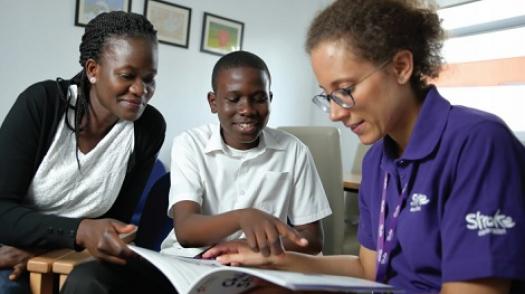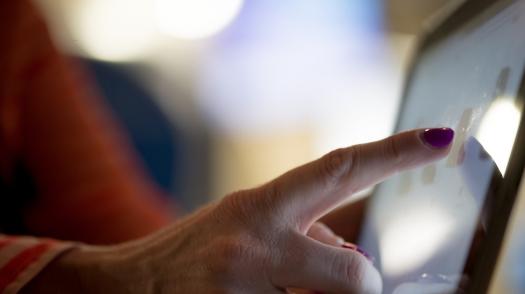
5 learnings and tips on childhood stroke
Our take-aways from The Stroke Association Parent Support day in London 2019.
At the age of 13, Elizabeth collapsed following a severe headache. She had suffered a stroke. Five years on, her mum, Danielle, talks about the impact on the family.

Published: December 2019. Date of brain injury: 2014. Child's age at time of injury: 13 years
I don’t think I appreciated the impact stroke would have on the whole family. Elizabeth’s stroke happened when we were all getting ready for a wedding in 2014. She collapsed suddenly with a severe headache, and an ambulance took Elizabeth to the local hospital.
Elizabeth was then transferred to Addenbrooke’s Hospital in Cambridge where she had surgery. Elizabeth stayed in hospital for rehabilitation.
When we came home from hospital we were surrounded by help and we thought that every person who came into the house was a miracle cure and they would make Elizabeth better.
Elizabeth made great strides early on but slowly progress slowed down and frustration set in.
Once back at home things didn’t get easier. It got to the point as a family that managing Elizabeth was a full-time job for the whole family. It was hard to get Elizabeth out of bed, she was negative, and with physio, OT and medical appointments it was just all-consuming. Our whole family life was all about Elizabeth.
For months after the stroke I couldn’t talk about Elizabeth. I cried the whole time. I couldn’t even see an ambulance without crying.
As parents you also grieve for the future your child isn’t going to get. Over time we became a family at war – frustrated, angry, nagging Elizabeth, arguing. And Elizabeth became detached.
Elizabeth returned to school, part-time at first, and we made lots of plans. These steps tried to make life easier but things didn’t always come through.
School only understood the physical effects of stroke and it was very difficult for them to understand it was a brain injury. School would do things like asking Elizabeth to carry a chair or they’d say she could relax on homework, but then she’d get a detention if she didn’t do it. It was very frustrating.
The lowest point was about 18 months after Elizabeth’s stroke when she said: ‘I don’t want to be here anymore’.
Elizabeth remembers how she lost friends and struggled with friendships. She tells people: “I constantly bounced around people and school trying to find my place.
“Either people were super sympathetic, and I didn’t want them to be, or they treated me like a normal person and they wouldn’t help me.”
Elizabeth was referred to a local young adults’ health and wellbeing service. The group helped with Elizabeth’s confidence.
I then heard about the CCPNR (Cambridge Centre for Paediatric Neuropsychological Rehabilitation), an NHS community-based service, and went on a mission to get Elizabeth on the programme. There were lots of tears, letters and we got the MP involved. For us it was an absolute game changer.
The programme focused on cognitive ability, looking at processing and everything about the brain injury itself. The therapists spoke to me and the whole family so we could understand what happened to Elizabeth and how it affected her brain. We learnt strategies on how we could understand how we could work with Elizabeth’s difficulties. And how her brain had to work a lot harder.
The CCPNR came into school and helped the teachers understand brain injury so it was huge for us.
Before we got this support we were at loggerheads the whole time as we couldn’t understand why Elizabeth couldn’t adapt.
With support we learnt what was best for Elizabeth. Now, unless Elizabeth is in danger I let her go with the decision she’s made. I had to remind myself of that sometimes – trying to change what she was wearing, for example. Now I just let her go.
My advice is to take every opportunity that comes your way.
Lots of services we accessed didn’t really work for Elizabeth. I got frustrated as I thought something would work then sometimes it didn’t.
We also found support for specific issues; for example support from Hemihelp, the Queen Elizabeth Foundation and a local organisation helped with forms. There was also an upper limb programme at UCL for children aged 16+.
I would tell other parents who are in a similar situation, it's important to remember that your child can continue to improve. Take every opportunity as you never know where it might lead.
We’ve got the happy family back again and last year Elizabeth won the Stroke Association's Children and Young People's Courage Award. We are massively proud.
Elizabeth is at college starting to discover there is life after stroke. We still have bad days but we just move onto the next day.
Elizabeth’s stroke was five years ago last July. But with support we suddenly understood more. It is so difficult for a teenager – they just want to be like everyone else.

Elizabeth is a Young Ambassador for The Stroke Association. She spoke at the charity's Childhood stroke event in November 2019.
Elizabeth received help from CCPNR, the first NHS community-based service in the UK offering assessment and neuropsychological rehabilitation for children with an acquired, non-progressive brain injury as a result of an accident, injury, illness or other condition. It is part of the Cambridgeshire and Peterborough NHS Foundation Trust.
Support after brain injury is also provided by The Children’s Trust. It provides a specialist neurorehabilitation service for children aged up to 18, both residentially from its National Specialist Centre in Tadworth, Surrey, and in communities across the UK through its Brain Injury Community Service.

Our take-aways from The Stroke Association Parent Support day in London 2019.

The Children's Trust Community Rehabilitation Service provides specialist goal-orientated neurorehabilitation delivered in the child's environment. Our ultimate goal is to maximise the child's participation in everyday life.

Read our guide to managing the return to school after an acquired brain injury.